Gender and Inclusion
Gender, age, abilities and other individual or context-specific characteristics present different opportunities and challenges to provide CVA to people in crisis in a dignified manner.
Among humanitarian actors, there is an increasing acknowledgement of the specific needs and constraints of people of differing abilities, older people, people of different genders, particularly women, and people on the move. Alongside this is a growing appreciation of the need for tailored and sensitive measures that ensure their effective inclusion.
Supporting the needs of diverse people with CVA goes beyond making them a target group; it is about meaningful engagement, purposive design and implementation, and programme adjustment to meet different groups’ needs with dignity. Inclusive approaches go hand in hand with people-centred aid.
Current priorities
The CALP Network will continue to encourage cash actors to widen their focus to be more inclusive and champion a fuller understanding of how CVA can go beyond the notion of ‘do no harm’ towards appropriately addressing the needs of diverse people in safe and dignified manners.
We will work to elevate the experiences and initiatives on CVA and gender, disability inclusive CVA, working with different ethnicities and cultural identities, minority groups, people with diverse sexual identities, and age groups.
CALP will also strive to make its work as accessible as possible.
Featured content

Collected Papers on Gender and Cash Transfer Programmes in Humanitarian Contexts
Report
Existing gender inequalities mean that disasters and conflicts impact women, men, girls and boys differently. Cash based assistance is one of the most significant developments in humanitarian assistance in recent years. But the relationship between gender and cash based assistance in humanitarian contexts is poorly understood. All too often, interventions are designed based on assumptions...

Microlearning video: CVA and Gender
Blog Post
This video provides an overview of the relationship between gender and cash and voucher assistance (CVA) structured around the humanitarian project cycle, which include: Assessment and response analysis: How to adjust the assessment processes to achieve a more accurate reflection of gender and markets. Design and implementation: How to use methods and protocols to reduce the potential...

Better Gender Outcomes in Food Assistance through Complementary and Multi-Modal Programing: Promising Practices Tip Sheet
Guidelines and Tools
This Tip Sheet is excerpted from the research report, “Better Gender Outcomes in Food Assistance through Complementary and Multi-Modal programming,” and gives promising practices by the cycles of project cycle management, as well as at the response level. Additionally, there are expert tips and wisdom practices that support the use of a gendered approach in development or humanitarian...

Cash & Voucher Assistance and Gender-Based Violence Compendium
Guidelines and Tools
The Compendium is intended as a companion to the 2015 Inter-Agency Standing Committee (IASC) Guidelines for Integrating Gender-Based Violence Interventions in Humanitarian Action and its companion resource, the GBV Pocket Guide. The guidance was developed through the efforts of 15 organizations who contributed expertise in the inception, design and review of the document. The process was led...
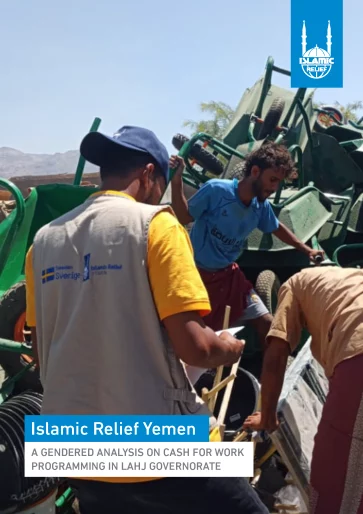
A Gendered Analysis on Cash for Work Programming in Lahj Governorate
Case Study
Cash for Work (CFW) programmes are designed to help the most vulnerable people meet their essential and basic needs. In Yemen, CFW interventions are responding to an ever-growing proportion of the Yemeni population that are in need of humanitarian assistance. Working with communities in the targeted areas of Hudayda and Lahj, the Swedish International Development Cooperation Agency SIDA-funded...
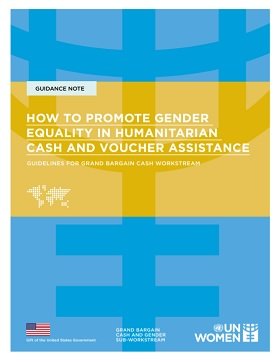
How to Promote Gender Equality in Humanitarian Cash and Voucher Assistance
Guidelines and Tools
The use of cash and voucher assistance (CVA) in humanitarian action is increasing rapidly.
With this rise, there is also growing demand by stakeholders to ensure CVA is more gender-responsive, addressing gender gaps and moving towards greater gender equality.
Gender-responsive CVA, which recognizes existing disparities and addresses the needs of all crisis-affected people equally, has the...
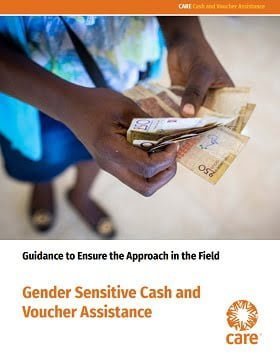
Gender-Sensitive Cash and Voucher Assistance: Guidance to ensure the approach in the field
Guidelines and Tools
This guidance builds on CARE’s ambition-via practice, research, evidence on CVA–and aims to support the application of gender sensitive CVA throughout the project cycle and at the response level. It is divided into two sections: – Part A: ‘What has been learned about gender sensitive CVA?,’ briefly explains the recommendations that came from the research. – Part B: ‘How do we...

Enablers and Gaps: Gender Equality, Gender-Based Violence Response and Mitigation in Cash and Voucher Assistance at Response levels: analysis on three case studies
Report
The Gender and Cash Sub-Workstream identified three case studies that illustrate how Cash Working Groups, GBV Sub-Clusters, gender focal points (e.g. Gender in Humanitarian Action Working groups at country and regional level) and humanitarian partnerships can enable meaningful and wider engagement on gender equity and GBV response in CVA. The case studies all show different aspects of linking...

How to mitigate gender-based violence (GBV) risks in cash and voucher assistance (CVA)
Video
Cash and voucher assistance (CVA) is an important tool to help individuals affected by crises get back on their feet. But just like any other form of assistance, it is vital to ensure that it does not fuel tensions in the household or in the community and that it does not create new risks for women and girls. Fortunately, there are a variety of ways that cash actors can work to mitigate risks...

Inclusive Information Systems for Social Protection: Intentionally Integrating Gender and Disability
Policy paper
Digital information systems serving the social protection sector, and especially social assistance, are increasingly prominent and will continue to be, as is the case within all other sectors. “Why? Because the ability of a country to care for its people and respond to their lifecycle needs depends on its ability to identify those who are in need, enroll them, provide tailored benefits and...
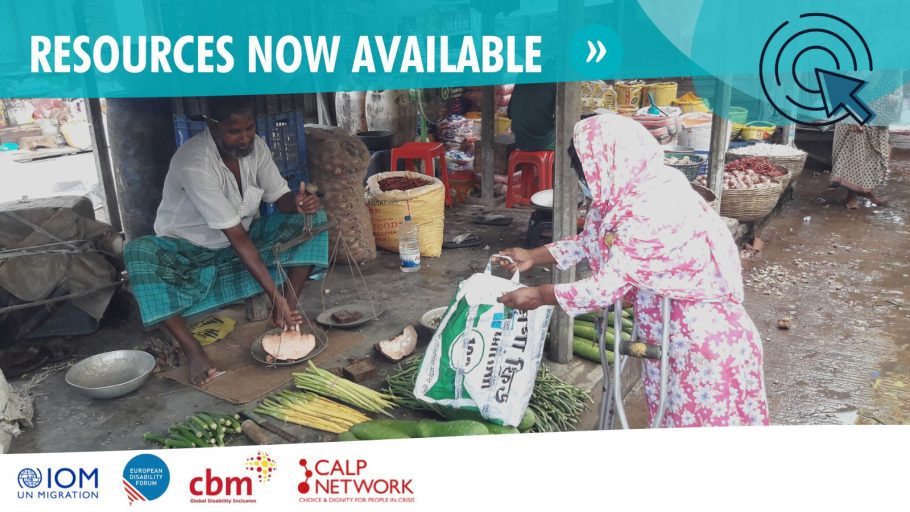
Mainstreaming disability inclusion into humanitarian CVA
Presentation
What is a rights-based approach to disability? How can disability inclusion be mainstreamed to ensure more inclusive and effective CVA humanitarian responses? To answer these key questions, CALP, CBM Global, European Disability Forum and International Organization for Migration (IOM), came together to organize the webinar “Mainstreaming disability inclusion into humanitarian CVA”, with the...
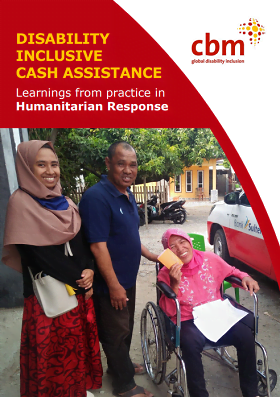
Disability Inclusive Cash Assistance: Learnings from Practice in Humanitarian Response
Guidelines and Tools
This case study collection describes lessons learned from seven inclusive humanitarian cash transfer projects implemented from 2015 – 2020 in Niger, Zimbabwe, Pakistan, Bangladesh, Philippines, and Indonesia, and five ongoing projects from the 2020 Covid-19 pandemic responses. This good practice collection aims to benefit both humanitarian practitioners engaged in Cash Based Interventions...
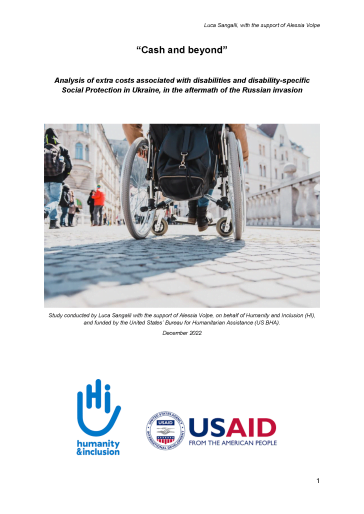
Cash and beyond – Analysis of extra costs associated with disabilities and disability-specific social protection in Ukraine, in the aftermath of the Russian invasion
Report
Following the escalation of the conflict in Ukraine in February 2022 and the consequent humanitarian crisis, the country has experienced active fighting and massive displacement, both within and outside its borders. Persons with disabilities and older persons have been facing particularly harsh effects, especially for those with more severe forms of disabilities, who encountered challenges in...
Thematic lead
Latest

CVA in COVID-19 Contexts: Guidance from the CALP Network
Guidelines and Tools
This is a summary of the key points from the many resources you shared on CVA and COVID through this document. This is a living document and we will continue to update this summary as new resources are added. The below is intended to help organisations understand and prepare for likely impacts of COVID-19...

COVID-19: Invest now in cash/voucher-social protection scale-up or children pay the price later
Report
Read the article here. Only socially accountable Social Protection Assistance beyond humanitarian cash/voucher programmes – if properly and quickly implemented – will protect generations of children from the aftershocks of COVID-19. Despite cash and voucher transfers becoming the tool of choice of...

COVID-19 & Urgent Need for Child-Sensitive Social Protection
Policy paper
The COVID-19 pandemic is negatively affecting children’s lives in a myriad of ways. Well-intentioned government containment and response efforts such as movement restrictions and school closures have disrupted education for more than 1.5 billion students, leaving some of the most vulnerable children...
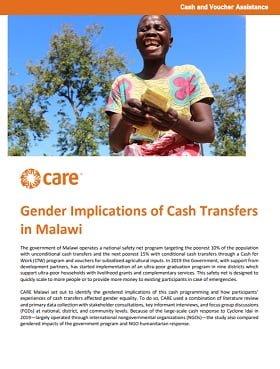
Gender Implications of Cash Transfers in Malawi
Case Study
CARE Malawi set out to identify the gendered implications of this cash programming and how participants’ experiences of cash transfers affected gender equality. Because of the large-scale cash response to Cyclone Idai in 2019—largely operated through international nongovernmental organisations...

The Importance of Acting on Grand Bargain Commitments for a Meaningful Focus on Gender in Cash and Voucher Assistance Responses to the Covid-19 Pandemic
Policy paper
Call at the time of COVID-19 for ensuring response is gender disaggregated and gender sensitive.

CVA and COVID-19 Tip Sheet for GBV and SRH Programming
Guidelines and Tools
Women and girls affected by the COVID-19 pandemic in crisis and displacement contexts may face increased risk of gender-based violence (GBV) as well as increased financial barriers to accessing sexual and reproductive health (SRH) care and services. CVA can address certain financial barriers to access SRH...
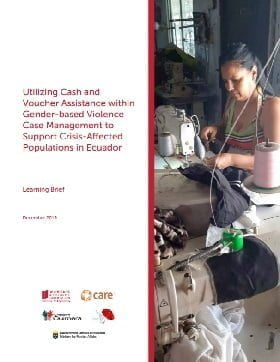
Utilizing Cash and Voucher Assistance within Gender-based Violence Case Management to Support Crisis-Affected Populations in Ecuador
Report
With support from Sweden’s Ministry for Foreign Affairs, Women’s Refugee Commission and CARE partnered to advance the Call to Action Roadmap by strengthening the capacity of GBV and CVA service providers in Ecuador to leverage CVA within case management services in the prevention of and response to...

Behavioral Design Checklist for Humanitarian Cash and Voucher Assistance Improving Outcomes for Women
Guidelines and Tools
This checklist highlights designs for humanitarian cash and voucher assistance (CVA) that can increase the impact
of CVA for women recipients in the Middle East and North Africa (MENA) region. The goal of the design principles presented is to optimize CVA to help recipients effectively spend the transfer...

Applying Behavioral Science to Humanitarian Cash camp; Voucher Assistance for Better Outcomes for Women
Report
Cash and voucher assistance (CVA) is widely recognized as an effective and powerful tool in humanitarian settings. Recent innovation in humanitarian CVA has sought to increase efficiency by harmonizing procedures and improving delivery through new technology; these
innovations have cut costs while...
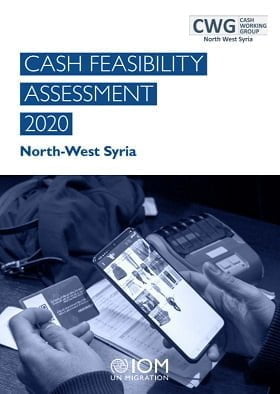
Cash Feasibility Assessment for NorthWest Syria
Report
The objective of this cash feasibility assessment for northwest Syria is to provide evidence-based, structured analysis of the various dimensions that make cash and vouchers interventions feasible. The primary audience for this document are all the organizations either currently involved in cash-based...

CVA and Gender in West and Central Africa
Event

How to Promote Gender Equality in Humanitarian Cash and Voucher Assistance
Guidelines and Tools
The use of cash and voucher assistance (CVA) in humanitarian action is increasing rapidly.
With this rise, there is also growing demand by stakeholders to ensure CVA is more gender-responsive, addressing gender gaps and moving towards greater gender equality.
Gender-responsive CVA, which recognizes...
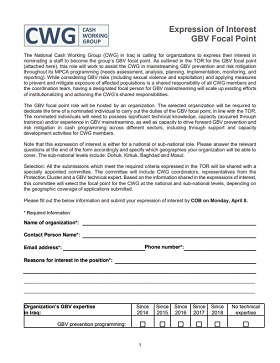
Expression of Interest GBV Focal Point
Policy paper
The National Cash Working Group (CWG) in Iraq is calling for organizations to express their interest in nominating a staff to become the group’s GBV focal point. As outlined in the TOR for the GBV focal point (attached here), this role will work to assist the CWG in mainstreaming GBV prevention and risk...

Burundi Case Study: How can we reduce GBV risks in cash and voucher assistance?
Guidelines and Tools
Cash and voucher assistance (CVA) has become a valuable and increasingly utilized tool in humanitarian response in Burundi. CVA has been shown to contribute to the resilience of vulnerable populations, but in order to maximize its effectiveness, humanitarian actors should establish Gender Based Violence...
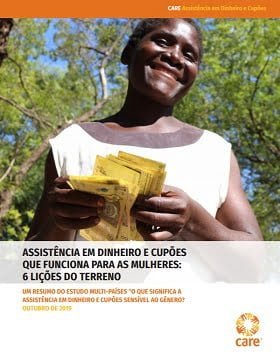
Assistência em Dinheiro e Cupões que Funciona para as Mulheres: 6 lições do terreno
Report
A Assistência em Dinheiro e Cupões (CVA) é actualmente uma ferramenta comum na acção humanitária que é utilizada para fazer face, com maior dignidade, às diversas necessidades de pessoas refugiadas por motivo de crises e conflitos. Embora existam cada vez mais evidências do efeito da CVA no...

Cash and Voucher Assistance that Works for Women: 6 lessons from the field
Report
Building on CARE’s commitment to be ‘cash ready’ to achieve breakthroughs with and for women and girl, CARE commissioned a study –in Malawi, Haiti, Jordan, the Philippines and Niger–on gender-sensitive CVA that allowed actual CVA recipients to frame the discussion. This is a brief from the...

Gender, Cash Assistance, and Conflict: Gendered Protection Implications of Cash and Voucher Assistance in Somalia/Somaliland
Report
The goal of this report is to further understand protection issues in Somalia/land and the implications of CVA on gendered protection issues in the region. This report is structured in reflection of that goal. Following the executive summary, a brief introduction was offered. The section that follows the...

What does Gender-Sensitive Cash and Voucher Assistance Look Like?
Report
CARE commissioned a study on gender-sensitive CVA from its own project participants and took place in Haiti, Niger, Jordan, Malawi and the Philippines.
The study aimed at understanding the:
-Extent to which women, men, boys, and girls have been involved in the design of CVA and the implications of
this...
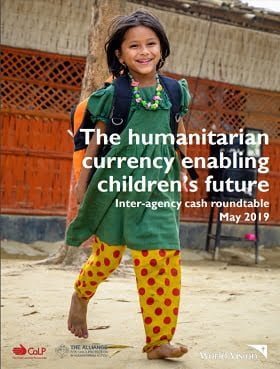
The humanitarian currency enabling children’s future – Inter-agency cash roundtable
Report
This summary report highlights key presentation insights, and recommendations from the CALP Network & World Vision co-hosted inter-agency Cash Roundtable, focusing on how CVA can be an enabler to promote child protection and child wellbeing, based on most recent research, case studies from across the...
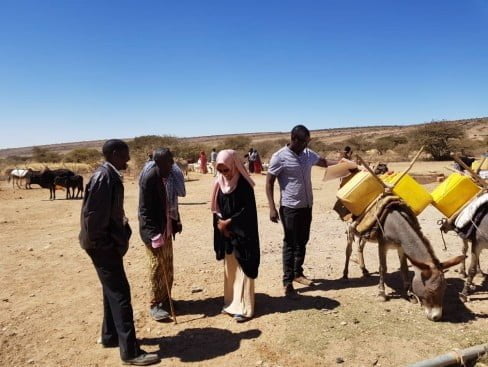
Celebrating #WomenHumanitarians from our Membership for World Humanitarian Day 2019
Blog Post
World Humanitarian Day is held every year on 19 August to pay tribute to aid workers who risk their lives in humanitarian service, and to rally support for people affected by crises around the world.



